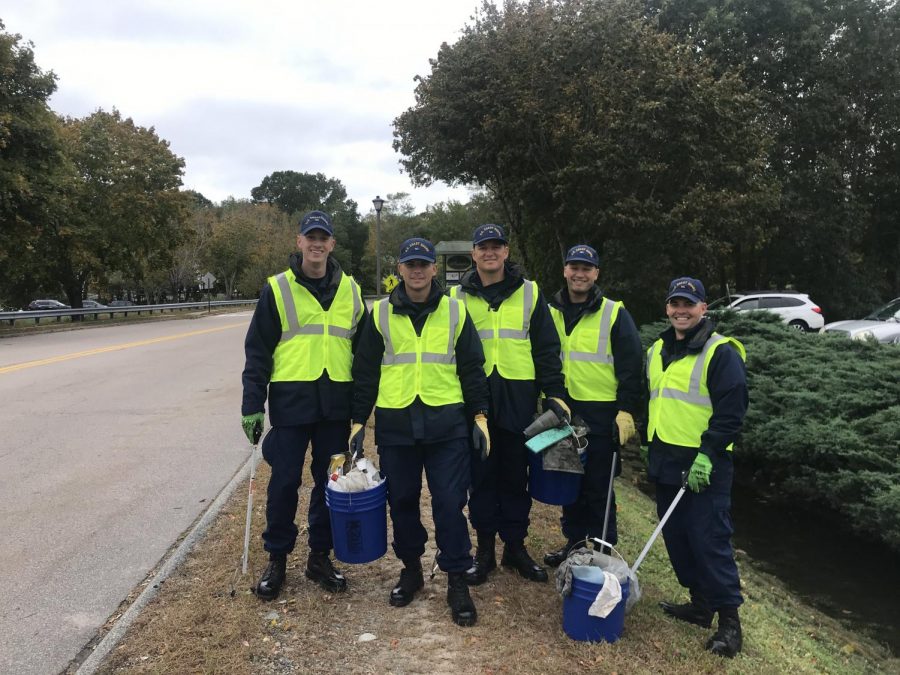Coast Guard Members Create a Cleaner Community
December 5, 2019
Destroyed ecosystems. Natural disasters. Warming oceans. Melting glaciers. Extinction of thousands of species in the Amazon and Galapagos. The drastic effects of climate change include sea-level rise, natural disasters, and threats to health. According to Breakthrough National Center for Climate Restoration, by 2050, human civilization will face dire, irreversible consequences, which begs the question, what are we doing to stop the global climate emergency?
Since 1975, Mystic Aquarium has seen first-hand the drastic effects of a polluted Earth as they rescue sick and injured marine animals. The Mystic Aquarium held a community-wide coastal clean-up on October 12, 2019 to urge citizens to reduce plastic waste, recycle, and keep our neighborhoods free of litter. Dozens of United States Coast Guard and National Oceanic Atmospheric Administration Corps members worked tirelessly to pick up trash from the streets of Mystic and Stonington, Connecticut.
“Just by having people see the name, the U.S. Coast Guard, on our uniform and they see us participating, it lets them know the government is here to lend a helping hand to people in our community,” stated Samuel Haley, member of the United States Coast Guard.
“The NOAA Corps does a lot of environmental missions to ensure we’re collecting accurate scientific data to help build policy and make effective decisions across the country about environmental work. We have a lot of disaster response missions to keep our country safe,” stated Emma Strong, member of the National Oceanic Atmospheric Administration Corps.
The primary goal of the Coast Guard and NOAA Corps is to reduce plastic waste in the community to prevent pollution. According to Ocean Crusaders, an environmental organization, every year, 6.4 million tons of plastic waste are dumped into the ocean, killing 100,000 marine animals. To combat the issue of plastic pollution, cadets are stepping up to the challenge.
“It’s important to keep our community clean so that our wildlife stays sustainable. Littering gets into our waterways, gets into our animals and kills their environments. We need to stop it,” explained John Jarrett, member of the United States Coast Guard.
As a result of the epidemic of littering, ecosystems around the world are experiencing a deterioration. Single-use plastics are a major contributor of litter that destroys ecosystems. The biggest contributors to litter include cigarette butts, fast food wrappers and cups, and plastic bags, according to nonprofit organization, Keep America Beautiful.
“A straw is just a moment on your lips, but it is hundreds of years left on this earth. Refuse the things that we don’t need, or carry stuff rather than use a plastic bag,” stated Mary-Ellen Mateleska, Director of Education and Conservation at Mystic Aquarium.
By urging each individual to do their part to reduce plastic waste, Coast Guard members hope to protect the Earth and leave a clean environment for future generations.
“In this day and age, we’re trying to make every stride towards a cleaner environment so we have to ask individuals to hold themselves accountable to throw their trash away and dispose of recyclables,” commented Haley.
“My son is my most important thing I’m worried about and he’s my legacy. When I’m gone, I want him to have a place that’s well taken care of and not destroyed. I want him to feel happy and feel at home on this planet,” expressed Anthony Harris, member of the U.S. Coast Guard.
Inspired to leave a more sustainable planet for his posterity, Harris participated in the Mystic Aquarium’s community-wide coastal clean-up by picking up litter from the streets of Stonington, Connecticut. The Mystic Aquarium’s Coastal Clean-Up picked up over 400 pounds of litter, but their fight to create a cleaner community is far from over.
“The more we build awareness by doing this clean-up, the more people will realize that what they do will make a difference,” stated Strong.
In response to the climate emergency, international climate activist, Greta Thunberg, led the Global Climate Strike, a protest of 7.6 million people who marched on the streets to demand a safe future and reduction of greenhouse gases. Local mitigation efforts to protect the environment include Connecticut’s Single-Use Plastic Checkout Ban, which is a $0.10 fee on plastic bags that will be collected by retailers throughout Connecticut.
Throughout the nation, people are taking action to create a cleaner environment, whether it may be marching in cities or picking up trash.

